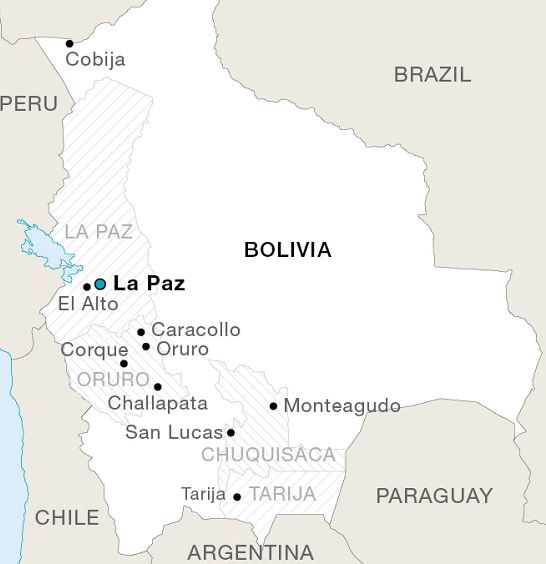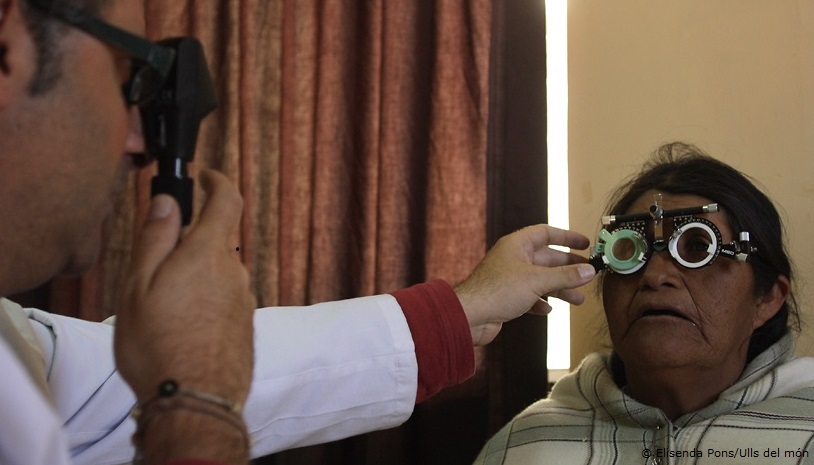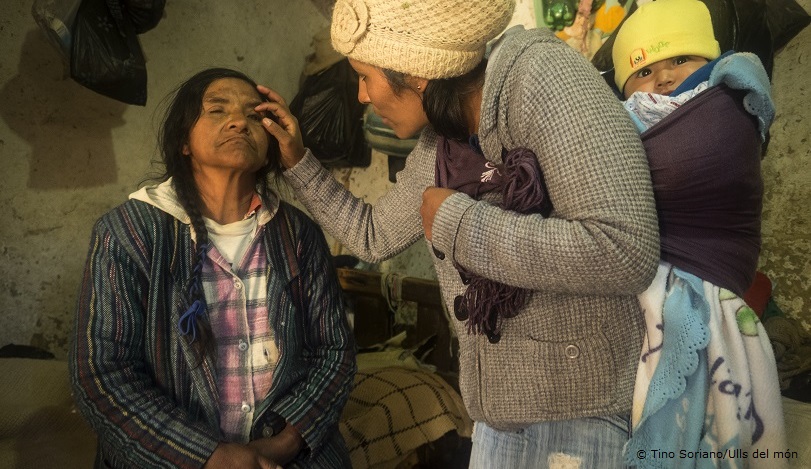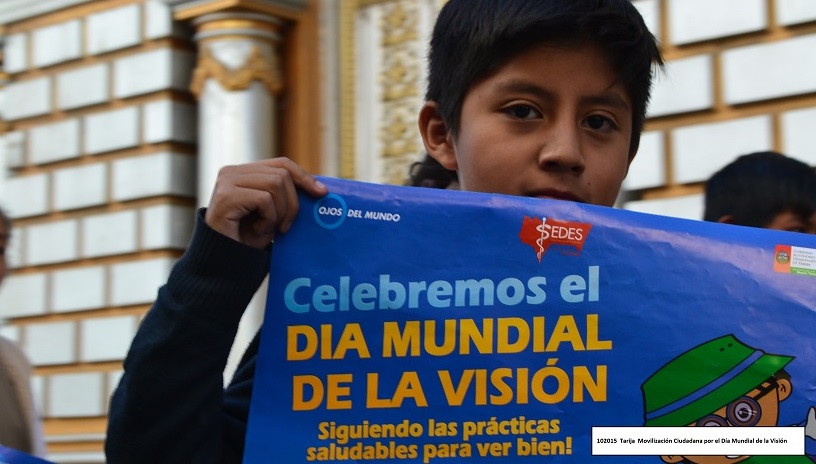
Ο Population: 11.5 million
Ο Life expectancy: 71.5 years
Ο Gross domestic product (GDP): $8,724
Ο Child mortality rate: 21.8 ‰
Ο Human Development Index (HDI): 0.718–107th position
Ο Gender Development Index (GDI): 0.945
Ο Multidimensional Poverty Index (MPI): 0.038
Ο Carbon dioxide emissions (tonnes per capita): 2.0
Source: UNDP's Human Development Report 2020.
Main ocular health data
It is estimated that there are 1.3 million people in Bolivia with vision loss
Ο Blindness: 60,804
Ο Moderate and severe visual impairment: 438,952
Ο Mild visual impairment: 384,385
Ο Near vision: 444,901
Ο Proportion of women: 53%
Source: The IAPB Vision Atlas 2020.
Implementing a comprehensive ophthalmic care system within the national health system

Eyes of the world started its activities in Bolivia in 2003 focusing on the municipality of El Alto and the rural communities of La Paz. Located on the high Andean plateau at an altitude of 4,000 metres, the 70 % of the population of the region has been classified as poor, extremely poor or destitute.
Before the arrival of Eyes of the world, there was virtually no ophthalmic care system in the area. Should they need ophthalmic care, the people of El Alto had to go to the capital of the country for consultation and treatments. This lack of ophthalmic care services in the area left blind those who did not possess the financial resources needed to go to the capital, receive a consultation and undergo surgery.
Therefore, Eyes of the world started a cooperation program with the local authorities—the Ministry of Health and Sports, the Municipal Government of El Alto, the Autonomic Departmental Service of Health, the Regional Health Service, and the National Institute of Ophthalmology. Aiming at improving eye health in the region, this cooperation program focused on creating a comprehensive ophthalmic care system that would provide efficient, accessible, and quality eye care for everyone in the region equally.
Throughout the first decade, Eyes of the world donated the necessary equipment and supplies for the correct functioning of five ophthalmology consultation rooms and two surgery rooms in local hospitals and El Alto health centres. Moreover, through grants and the organisation of theoretical and practical courses, Eyes of the world trained specialists, ophthalmologists and other health professionals so that they could self-sufficiently treat the people and manage the region’s eye care services.

In 2013, Eyes of the world proudly transferred to the Bolivarian authorities the management of the already established ophthalmic care system. Since then, it is the Bolivarian authorities, accompanied by our foundation, that guarantee the correct functioning of the ophthalmic care system. It is now the Bolivarian authorities that guarantee the care and treatment of the El Alto people suffering from refractive errors and in a vulnerable situation.
The great success of this experience validated the Eyes of the world action plan in Bolivia. Therefore, in Bolivia, this plan was replicated in the Southern region of Tarija. During the initial research study carried out by Eyes of the world, it was found that people in Tarija encountered great difficulties in accessing eye care and, especially, eye surgeries. Eyes of the world has already equipped an ophthalmology surgical unit in the Tarijan local health system and is currently working to develop a comprehensive ophthalmic care system in the region.
Moreover, since 2016, Eyes of the world has been replicating its Bolivarian action plan in the Oruro region and, more recently, in the Chuquisaca region. Following the foundation’s efforts, the Oruro region has already developed and established a primary eye care system. Both in the Oruro and Chuquisaca regions, Eyes of the world is working closely with the local authorities towards the development of a self-managed and self-sustainable comprehensive ophthalmic care system.

Following the path towards the eradication of avoidable blindness in Bolivia, Eyes of the world has promoted several eye disease preventive actions over the years. In addition, it has educated the population on basic eye hygiene habits focusing on children at home and in the school. Furthermore, Eyes of the world has reached out to community leaders to raise awareness on the people’s Universal Right to Sight. Finally, Eyes of the world has promoted and participated in the implementation of ambitious governmental projects regarding the fight against avoidable blindness. One example of these projects would be the National Committee for Eye Health.
Eyes of the world is currently working in several areas all over the country (also in conjunction with local entities Fundesol, Cáritas Coroico and Fundación Tesai) in order to guarantee the Bolivarian people’s access to ophthalmic care paying special attention to women and girls. With this project, Eyes of the world aspires to contribute to overcoming the extreme poverty situation Bolivia is in. Working with these partners means that the project's intervention area is being extended, reaching more people and creating sustainable intervention models that can be replicated in environments such as the Amazonian area of La Paz or Santa Cruz.
Ubaldina was selling food in the street. Until cataracts left her without vision. She could not see, nor cook, nor be autonomous. Our commission in Bolivia was able to treat her through surgery and now she has recovered her sight and is back to her food stall. She recently acknowledged one of our collaborators at a great distance and we could record this beautiful document that we want to share with you. Discover this story with a happy ending!
Eyes of the world approached Sebastián (Sebas) Alfie of Minimal Films to make a video about its program, Eyes of Bolivia, in the El Alto municipality. Whilst looking for crew to do this, Sebas met Gabor, a retired photographer who had lost his sight ten years ago. Sebas asked him to work as his collaborator and film together in Bolivia.
Activity report 2023 (PDF)
Activity report 2021 (PDF)
Activity report 2020 (PDF)
Contact office in Bolivia
C/ J.J. Pérez, pasaje Urdininea, n.º 22, 2º
Zona Sopocachi Bajo
La Paz
Bolivia
Tel. +5912440543